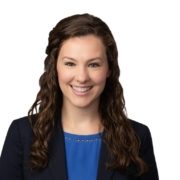Spotlight on Flex – Allison Binkley
Our Spotlight on Flex showcases professionals from member organizations who exemplify personal and professional success while working a flexible schedule. Their stories illustrate the long-term benefits that flexible schedules offer to both individuals and organizations.
2020 Spotlights
For January 2020, we are pleased to share insights from Allison Binkley Partner, Squire Patton Boggs (Columbus, OH)
DFA: How have you made flexibility a priority and a success with your schedule?
 AB: Before joining Squire Patton Boggs (“Squire”) in 2014, I worked at another large regional law firm and focused my practice on public finance. After my daughter was born, I changed my schedule to telecommute one day a week, but after a year, I wanted more flexibility in my schedule and more time to spend with her. That firm already had several attorneys working reduced hours, and it was clear our practice group’s partners were supportive of flexible work arrangements. I switched to an 80% reduced hours schedule and was in the office four days a week.
AB: Before joining Squire Patton Boggs (“Squire”) in 2014, I worked at another large regional law firm and focused my practice on public finance. After my daughter was born, I changed my schedule to telecommute one day a week, but after a year, I wanted more flexibility in my schedule and more time to spend with her. That firm already had several attorneys working reduced hours, and it was clear our practice group’s partners were supportive of flexible work arrangements. I switched to an 80% reduced hours schedule and was in the office four days a week.
By the end of my tenure at my previous firm, the practice group consisted of just myself and a senior partner. The firm was great, but I knew I wanted to expand my practice expertise. Over the years, I developed great working relationships with several of the attorneys here at Squire, and they approached me to make a lateral move. I was worried, however, that I wouldn’t find the same type of flex support at Squire that I had at my current firm.
Those fears quickly went out the window. Squire’s managing partner didn’t hesitate to agree to my request to join the firm on a reduced hours schedule; he said we hire good people, and we give our people what they need. That was almost six years ago, and even though the structure of my flex schedule may have changed, the support from the firm has not.
I lateraled as a senior associate to Squire in 2014, was promoted to principal in 2016, and promoted again to partner in 2018 – all while working reduced hours and one day a week from home. Now that my daughter is school age, I work an 80% reduced hours schedule and telecommute one day a week (usually Fridays). I leave at an earlier time so I can be home to pick her up and participate in her activities.
DFA: How have the firm and/or clients contributed to your Flex Success®?
AB: I have a lot of latitude and independence because the firm has several other attorneys working some type of flex schedule. I came to the firm with a book of business, and since joining Squire, have continued to grow that book of business. Some of my clients know about my schedule, and others don’t. At the end of the day, it doesn’t and shouldn’t matter as long as I’m responsive and meeting their needs.
DFA: How has working flexibly made your career more sustainable and contributed to business/professional development opportunities?
AB: My time in the office translates to time spent on business and professional development too. I’m very active in the Ohio Government Finance Officers Association (“GFOA”) – a trade group of finance officers from local governments as well as public finance professionals. It’s a great group of professionals, and I’m currently serving a three year term on the Board of Trustees. We also host an annual conference with 500 – 600 attendees, and I’m part of the planning committee. Without flexibility at work, I wouldn’t be able to be as involved in Ohio GFOA. I’d be missing the opportunity to collaborate and network with so many of my peers outside of the law firm.
I’m also an adjunct professor at the Ohio State University Moritz College of Law. It’s my third year of teaching, and it’s such a rewarding experience. Again, without my flex schedule, I would never be able to partake in all these wonderful professional/business development opportunities and spend the amount of time that I’d like with my family.
DFA: Looking back, would you do anything differently, or what would you tell your younger self?
AB: I would tell myself not to sweat it. Flexible work arrangements were not on the top of my mind when I started practicing. But they became very important to me once I was a parent, and I knew my schedule was going to change drastically. I knew it would work out because the support structures at the firm were in place.
DFA: How do you recharge, and how do you pay it forward?
AB: I’ve been fortunate to have amazing and supportive partners over the years who’ve also been my mentors. I didn’t have to be a trailblazer for flexible work at the firm, but I do want to make sure I’m paying it forward. I try to use my experiences to help younger associates as they figure out what works best for them now – or five years from now.
I plan to continue to be active with my outside organizations, support my local community, and support my daughter’s school. These are ways that I’m able to recharge. But I’m also able to reset by spending time with my family, traveling, and taking advantage of the outdoors and outdoor activities during the warm weather months here in Ohio.







